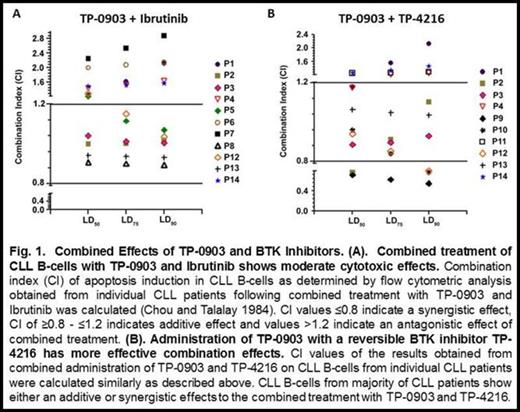Abstract
Introduction: B-cell chronic lymphocytic leukemia (CLL) is an incurable disease despite that still requires options for treatment despite recent advances with BTK therapy. We previously found that Axl receptor tyrosine kinase (RTK), a member of the TAM (Tyro3, Axl, MER) family of RTKs, plays a critical role in CLL B-cell survival (Blood 2011, 117:1928). Here, we explored the levels of apoptosis induction of CLL B-cells using a novel high-affinity Axl inhibitor as a single agent or in combination with BTK inhibitors.
Methods: Expression/activation status of the Tyro3, Axl and MER in CLL B-cells was evaluated by Immunoprecipitation/Western blots. Cells were treated with a high-affinity orally bioavailable Axl inhibitor TP-0903 (Tolero Pharmaceuticals) or FGFR inhibitor TKI-258 (Novartis) with or without the presence of CLL bone marrow stromal cells (BMSCs). Impact of Axl or FGFR signal inhibition on CLL B-cell survival was also evaluated by flow cytometry after staining with annexin V/propidium iodide. Finally, cells were exposed to TP-0903 in combination with BTK inhibitors to determine any synergistic/additive effects of the combination in induction of apoptosis. Combination index (CI) of two agents was calculated using the method of Chou and Talalay, 1984.
Results: Although we defined pro-survival role of Axl in CLL B-cells, contribution of other members of the TAM family of RTKs including Tyro3 and MER to prolonged survival of the leukemic B-cells remains largely undefined. In this study we found that CLL B-cells overexpress Tyro3, but not MER, and that Tyro3 is constitutively phosphorylated. Interestingly, immunoprecipitation of Tyro3 from CLL B-cell lysates shows retention of highly active Axl in the immune complex suggesting that these two RTKs either heterodimerize or form a molecular complex in CLL B-cells.
Our earlier work found that Axl regulates multiple cell survival signaling pathways including PI3K/AKT and Src and that, Axl inhibition using a first generation Axl inhibitor induced apoptosis in CLL B-cells (Blood 2011, 117:1928). Thus, we hypothesized that targeting Axl using a very high affinity Axl inhibitor would induce even higher levels of apoptosis in CLL B-cells compared to the first generation Axl inhibitor. To address this, we utilized a high-affinity orally bioavailable Axl inhibitor TP-0903 to generate preliminary information on its efficiency to specifically target Axl and the level of apoptosis induction in CLL B-cells. Indeed TP-0903 as a single agent induced a robust apoptotic cell death in CLL B-cells within 24 hours of exposure at nanomolar doses, which are easily achievable in vivo (information provided by Tolero Pharmaceuticals). Interestingly, while TP-0903 effectively reduces phosphorylation on Axl in CLL B-cells, it was unable to target P-Tyro3 suggesting that Axl is likely the predominant RTK of the TAM family in CLL B-cells. A marked reduction of the anti-apoptotic proteins Mcl-1, Bcl-2, XIAP and upregulation of the pro-apoptotic protein BIM in CLL B-cells via activation of its upstream regulator FOXO3a were noted as a result of inhibition of P-Axl and its downstream signaling pathways, P-AKT/P-Src. Importantly, TP-0903 was able to overcome CLL BMSC mediated protection of the leukemic B-cells from apoptosis induction. Given the observed robust induction of apoptosis with TP-0903 and the known impact of BTK inhibitors on CLL patient clinical outcome, we then exposed CLL B-cells to TP-0903 in combination with two BTK inhibitors that included Ibrutinib and a reversible BTK inhibitor TP-4216 (a kind gift from Tolero Pharmaceuticals). Based on the CI values, we found that the in vitro combination of TP-0903 and Ibrutinib showed additive effects in CLL B-cells from 6 of 11 CLL patients, CLL B-cells from the remaining 5 CLL patients showed antagonistic effects (Fig. 1A). However, we observed synergistic effects of TP-0903 in combination with TP-4216 in the induction of apoptosis in CLL B-cells from 2 of 10 patients and additive effects in CLL B-cells from 6 patients (Fig. 1B). Cells from the remaining 2 patients exhibited a slightly antagonisticeffect.
Conclusion: In total, these results suggest that TP-0903 is quite effective in inducing robust CLL B-cell apoptosis as a single agent even at a nanomolar concentration and its combination with the reversible BTK inhibitor TP-4216 could be an effective and unique strategy for the treatment of CLL patients.
Warner:Tolero Pharmaceuticals: Employment, Equity Ownership, Patents & Royalties. Bearss:Tolero Pharmaceuticals: Employment. Shanafelt:Genentech: Research Funding; GlaxoSmithKline: Research Funding; Celegene: Research Funding; Cephalon: Research Funding; Pharmacyclics/Jannsen: Research Funding; Hospira: Research Funding; Polyphenon E Int'l: Research Funding. Kay:Genetech: Research Funding; Pharmacyclics: Research Funding; Hospira: Research Funding; Celgene: Membership on an entity's Board of Directors or advisory committees; Gilead: Membership on an entity's Board of Directors or advisory committees.
Author notes
Asterisk with author names denotes non-ASH members.


This feature is available to Subscribers Only
Sign In or Create an Account Close Modal